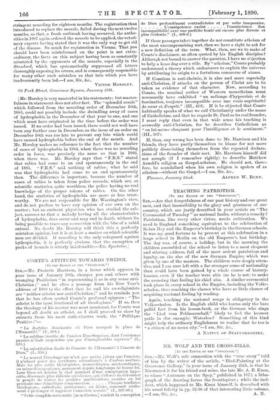COMTE'S ATTITUDE TOWARDS THEISM.
[To THE EDITOR OF THE ' SPECTATOR,"1
SIR,—Mr. Frederic Harrison, in a letter which appears in your issue of January 18th, charges you and others with wronging Positivism "in representing it as in any sense anti- Christian ;" and he cites a passage from his New Year's address of 1889 to the effect that he and his co-religionists are "neither atheist nor anti-Christian ;" and he reminds you that he has often quoted Comte's profound epigram : "The atheist is the most irrational of all theologians." If so, then the theology of his master was most irrational, for Comte was beyond all doubt an atheist, as I shall proceed to show by extracts from his most authoritative work, the " Politique Positive :"—
" La doctrine Aominante oh Dien usurpait la place de l'Humanite." (I., 261.) "La sublime inertie de l'ancien Etre-Supreme, dent l'existence passive n'etait suspendue quo par d'inexplicables caprices." (I., 335.) "La substitution finale de l'amour de l'IltunanittS i l'amour de Dieu." (I., 356.) "Le nouvel Etre-Supreme n'est pas moms jaloux que l'ancien; ii n'admet point des serviteurs subordonnes a d'antres mares. Mais les plus actifs theologistes, monarchiques, aristocratiques, on mime demagogiques, manquent depuis longtemps de bonne foi. Leur Dieu est devenu le chef nominal d'une conspiration hypo- crite, desormais plus ridicule qu'odieuse, qui s'efforce de detourner le peuple de toutes les grandes ameliorations sociales en lui prechant une chimerique compensation Chaque tendanee theologique, catholique, protestante, on deiste, concourt reelle- ment a prolonger et aggraver l'anarchie morale." (I., 397-98.)
"Cette complete autocratie [monotheism] rendait la conception de Dieu profondement contradictoire et par suite temporaire.
L'omnipotence exclut romniscience. Son incompatibilite avec une parfaite bonte est encore plus directe et plus Ovidente." (I., 408-9.)
If these passages take?. together do not constitute atheism of the most uncompromising sort, then we have a right to ask for a new definition of the term. What, then, are we to make of Comte's disclaimer, so often quoted by his English disciples ?
Although not bound to answer the question, I have no thjection_ to help a lame dog over a stile. By "atheism," Comte probably understood a theory which endeavours to explain the universe by attributing its origin to a fortuitous concourse of atoms.
If Comtism is anti-theistic, it is also and more especially anti-Christian, if attacks on the person of Christ are to be taken as evidence of that character. Now, according to Comte, the nominal author of Western monotheism must necessarily have exhibited " un melange d'hypocrisie et de fascination, toujours incompatible avec une vraie superiorite de cceur et d'esprit." (III., 413). If it be objected that Comte habitually speaks of what we call Christianity under the name of Catholicism, and that he regards St. Paul as its real founder, I must reply that even in that wide sense his teaching is avowedly anti-Christian, for he describes Catholicism as "en lui-meme choquant pour Fintelligence et le sentiment."
507).
If, then, any wrong has been done to Mr. Harrison and his friends, they have partly themselves to blame for not more publicly dissociating themselves from the repeated declara- tions of the founder of their sect. Mr. Harrison himself did not scruple (if I remember rightly) to describe Matthew Arnold's religion as Gospel-atheism. He should not, there- fore, be scandalised when his own religion is spoken of as atheism—without the Gospel.—I am, Sir, &c.,


































 Previous page
Previous page